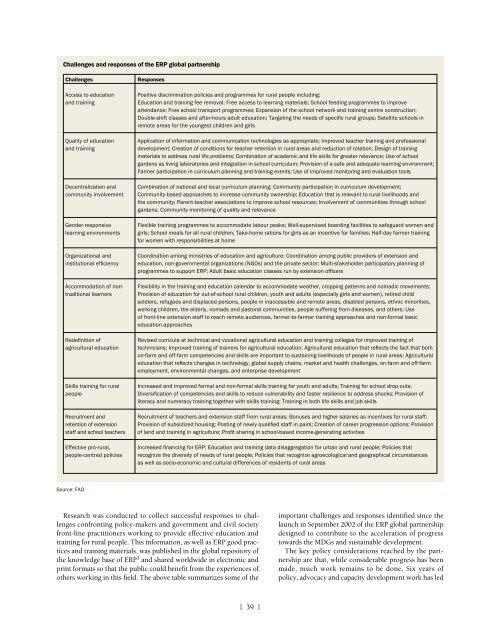Tomorrow today; 2010 - unesdoc - Unesco
Tomorrow today; 2010 - unesdoc - Unesco
Tomorrow today; 2010 - unesdoc - Unesco
You also want an ePaper? Increase the reach of your titles
YUMPU automatically turns print PDFs into web optimized ePapers that Google loves.
Challenges and responses of the ERP global partnershipChallengesAccess to educationand trainingQuality of educationand trainingDecentralization andcommunity involvementGender-responsivelearning environmentsOrganizational andinstitutional efficiencyAccommodation of nontraditionallearnersRedefinition ofagricultural educationSkills training for ruralpeopleRecruitment andretention of extensionstaff and school teachersEffective pro-rural,people-centred policiesResponsesPositive discrimination policies and programmes for rural people including:Education and training fee removal; Free access to learning materials; School feeding programmes to improveattendance; Free school transport programmes; Expansion of the school network and training centre construction;Double-shift classes and after-hours adult education; Targeting the needs of specific rural groups; Satellite schools inremote areas for the youngest children and girlsApplication of information and communication technologies as appropriate; Improved teacher training and professionaldevelopment; Creation of conditions for teacher retention in rural areas and reduction of rotation; Design of trainingmaterials to address rural life problems; Combination of academic and life skills for greater relevance; Use of schoolgardens as living laboratories and integration in school curriculum; Provision of a safe and adequate learning environment;Farmer participation in curriculum planning and training events; Use of improved monitoring and evaluation toolsCombination of national and local curriculum planning; Community participation in curriculum development;Community-based approaches to increase community ownership; Education that is relevant to rural livelihoods andthe community; Parent-teacher associations to improve school resources; Involvement of communities through schoolgardens; Community monitoring of quality and relevanceFlexible training programmes to accommodate labour peaks; Well-supervised boarding facilities to safeguard women andgirls; School meals for all rural children; Take-home rations for girls as an incentive for families; Half-day farmer trainingfor women with responsibilities at homeCoordination among ministries of education and agriculture; Coordination among public providers of extension andeducation, non-governmental organizations (NGOs) and the private sector; Multi-stakeholder participatory planning ofprogrammes to support ERP; Adult basic education classes run by extension officersFlexibility in the training and education calendar to accommodate weather, cropping patterns and nomadic movements;Provision of education for out-of-school rural children, youth and adults (especially girls and women), retired childsoldiers, refugees and displaced persons, people in inaccessible and remote areas, disabled persons, ethnic minorities,working children, the elderly, nomads and pastoral communities, people suffering from diseases, and others; Useof front-line extension staff to reach remote audiences, farmer-to-farmer training approaches and non-formal basiceducation approachesRevised curricula at technical and vocational agricultural education and training colleges for improved training oftechnicians; Improved training of trainers for agricultural education; Agricultural education that reflects the fact that bothon-farm and off-farm competencies and skills are important to sustaining livelihoods of people in rural areas; Agriculturaleducation that reflects changes in technology, global supply chains, market and health challenges, on-farm and off-farmemployment, environmental changes, and enterprise developmentIncreased and improved formal and non-formal skills training for youth and adults; Training for school drop-outs;Diversification of competencies and skills to reduce vulnerability and foster resilience to address shocks; Provision ofliteracy and numeracy training together with skills training; Training in both life skills and job skillsRecruitment of teachers and extension staff from rural areas; Bonuses and higher salaries as incentives for rural staff;Provision of subsidized housing; Posting of newly qualified staff in pairs; Creation of career progression options; Provisionof land and training in agriculture; Profit sharing in school-based income-generating activitiesIncreased financing for ERP; Education and training data disaggregation for urban and rural people; Policies thatrecognize the diversity of needs of rural people; Policies that recognize agroecological and geographical circumstancesas well as socio-economic and cultural differences of residents of rural areasSource: FAOResearch was conducted to collect successful responses to challengesconfronting policy-makers and government and civil societyfront-line practitioners working to provide effective education andtraining for rural people. This information, as well as ERP good practicesand training materials, was published in the global repository ofthe knowledge base of ERP 3 and shared worldwide in electronic andprint formats so that the public could benefit from the experiences ofothers working in this field. The above table summarizes some of theimportant challenges and responses identified since thelaunch in September 2002 of the ERP global partnershipdesigned to contribute to the acceleration of progresstowards the MDGs and sustainable development.The key policy considerations reached by the partnershipare that, while considerable progress has beenmade, much work remains to be done. Six years ofpolicy, advocacy and capacity development work has led[ 39 ]

















